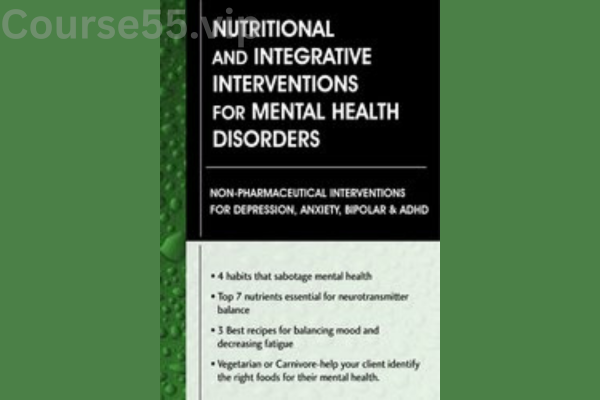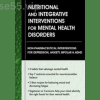Nutritional and Integrative Interventions for Mental Health Disorders: Non-Pharmaceutical Interventions for Depression, Anxiety, Bipolar & ADHD By Leslie Korn – PESI
$219.00 Original price was: $219.00.$23.10Current price is: $23.10.
Nutritional and Integrative Interventions for Mental Health Disorders: Non-Pharmaceutical Interventions for Depression, Anxiety, Bipolar & ADHD – Digital Download!

Nutritional and Integrative Interventions for Mental Health Disorders: Non-Pharmaceutical Interventions for Depression, Anxiety, Bipolar & ADHD By Leslie Korn – PESI
Overview

Comprehensive Approaches to Mental Health: The Role of Nutrition and Integrative Therapies
Dr. Leslie Korn’s book, Nutritional and Integrative Interventions for Mental Health Disorders: Non-Pharmaceutical Interventions for Depression, Anxiety, Bipolar & ADHD, presents a deep dive into the vital relationship between nutrition and mental health. This insightful work introduces evidence-based strategies that enhance mental health care by addressing dietary deficiencies and emphasizing nutrition’s role in both physical and psychological well-being. By encouraging a broader perspective beyond conventional pharmaceutical treatments, Korn provides alternative pathways to improving mental health.
Many discussions on mental well-being tend to overlook nutrition, yet Dr. Korn makes a compelling argument that dietary improvements can significantly alleviate symptoms of disorders like depression, anxiety, bipolar disorder, and ADHD. Her book establishes a solid foundation for integrating nutritional strategies into mental health care, stressing the need for a more holistic approach.
The Connection Between Nutrition and Mental Well-Being
Dr. Korn thoroughly explores how both macronutrients and micronutrients influence mood and behavior. A core objective of her book is to empower mental health professionals with the knowledge to link dietary habits with therapeutic interventions. She underscores the physiological changes that exacerbate mental health challenges, highlighting how nutritional imbalances can contribute to psychological distress.
Deficiencies in essential nutrients can lead to both physical and mental health issues, creating a cycle of declining well-being. For example, inadequate levels of omega-3 fatty acids, B vitamins, and minerals like magnesium have been associated with mood disorders. Conversely, restoring these nutrients through dietary modifications or supplementation has the potential to improve mental health significantly.
A key aspect of Korn’s research is its focus on the hormonal influences on mental health. She argues that proper nutrition plays a vital role in stabilizing hormonal imbalances that impact mood and cognitive functions. For instance, diets rich in omega-3 fatty acids have been linked to increased serotonin levels, which support emotional regulation. Recognizing these connections promotes a more integrative mental health treatment model that aligns diet with psychological support.
Comparing Mental Health Disorders and Nutritional Imbalances
To illustrate the relationship between mental health and nutrition, Korn compares psychological disorders with nutritional deficiencies, highlighting key distinctions:
| Aspect | Mental Health Disorders | Nutritional Imbalances |
|---|---|---|
| Definition | Psychological conditions affecting daily life | Deficiencies in essential nutrients impacting health |
| Symptoms | Mood swings, anxiety, depression, cognitive decline | Fatigue, irritability, mood fluctuations, cognitive issues |
| Causes | Genetic, environmental, and psychological factors | Poor diet, malabsorption, lack of dietary variety |
| Interventions | Therapy and medication | Dietary adjustments, supplementation, and education |
| Treatment Duration | May require long-term management | Can often improve relatively quickly with dietary changes |
By presenting these distinctions, Korn underscores the necessity of a dual approach to treatment. While medications play a crucial role, integrating nutritional strategies can enhance overall mental health outcomes.
Incorporating Nutritional Assessments in Mental Health Treatment
A significant contribution of Korn’s work is her guidance for mental health professionals on implementing nutritional assessments in clinical practice. She outlines practical steps that practitioners can take to evaluate a client’s dietary habits and provide informed recommendations.
Key Steps in Nutritional Assessments
• Gather Nutritional History: Collect information on the client’s diet, food preferences, and any past dietary interventions.
• Utilize Screening Tools: Employ validated tools to assess nutrient levels and identify potential deficiencies.
• Educate Clients: Inform individuals about how nutrition impacts mental health and provide practical dietary suggestions.
• Monitor Progress: Continuously evaluate nutritional status and mental health outcomes, making adjustments as needed.
Korn envisions nutritional interventions as a complementary approach rather than a replacement for traditional mental health treatments. By adopting a multi-dimensional approach, clinicians can develop more personalized care strategies that consider each client’s genetic, cultural, and physiological needs.
Culinary Medicine and the Role of Dietary Planning
Dr. Korn introduces culinary medicine as an essential component of integrative mental health care. This concept emphasizes the therapeutic value of cooking and preparing nutritious meals, promoting mindfulness, creativity, and emotional well-being.
The book outlines several dietary approaches designed to support mental health, including:
• Mediterranean Diet: High in fruits, vegetables, nuts, whole grains, and fish, this diet has been linked to lower rates of depression and anxiety.
• Plant-Based Nutrition: Diets centered on whole, minimally processed plant foods can enhance mental health by reducing inflammation and increasing nutrient intake.
• Anti-Inflammatory Diet: Foods that combat inflammation, such as fatty fish and leafy greens, may help regulate mood and cognitive function.
By encouraging these dietary modifications alongside conventional mental health therapies, Korn provides a comprehensive framework for improving well-being.
A Holistic Approach to Mental Health Treatment
Dr. Leslie Korn’s extensive experience in integrative health informs her holistic approach to mental health treatment. She advocates for personalized care strategies that consider each individual’s biological, psychological, and cultural factors. By broadening mental health care to include nutrition, she challenges traditional treatment models and encourages a more comprehensive approach to well-being.
A central theme in Korn’s philosophy is the importance of collaboration among healthcare professionals. She encourages mental health practitioners to work alongside nutritionists and dietitians to create well-rounded care plans that optimize patient outcomes.
Challenges in Integrating Nutritional Approaches
Despite the growing recognition of nutrition’s role in mental health, several obstacles can hinder the widespread adoption of integrative strategies:
• Limited Awareness: Many mental health practitioners may not fully understand the impact of nutrition on psychological well-being.
• Time Constraints: Clinicians often struggle to incorporate comprehensive nutritional assessments into their already demanding schedules.
• Training Deficits: A lack of formal education in nutrition can leave mental health professionals feeling unprepared to make dietary recommendations.
• Client Resistance: Individuals may be hesitant to modify their diet or may not recognize the connection between nutrition and mental health.
To overcome these barriers, Korn highlights the need for ongoing education, training programs, and interdisciplinary collaboration to help clinicians integrate nutrition into their practice effectively.
Conclusion
Dr. Leslie Korn’s Nutritional and Integrative Interventions for Mental Health Disorders makes a significant contribution to the evolving conversation on mental health treatment. By illuminating the profound link between nutrition and psychological well-being, Korn provides mental health professionals with a roadmap for incorporating non-pharmaceutical interventions into their practice.
Her holistic perspective reimagines mental health care by prioritizing nutrition alongside traditional treatments. As clinicians embrace this integrative model, they can improve the quality of life for individuals struggling with mental health disorders, fostering a future where dietary interventions play a central role in mental well-being.
Frequently Asked Questions:
Business Model Innovation: We operate a group buying strategy, allowing participants to share costs and access popular courses at reduced prices. This model benefits individuals with limited financial resources, despite concerns from content creators about distribution methods.
Legal Considerations: The legality of our operations involves complex issues. Although we don’t have explicit permission from course creators to resell their content, there are no specific resale restrictions stated at the time of purchase. This ambiguity creates an opportunity for us to provide affordable educational resources.
Quality Control: We ensure that all course materials purchased are identical to those offered directly by the creators. However, it’s important to understand that we are not official providers. As such, our offerings do not include:
– Live coaching calls or sessions with the course author.
– Access to exclusive author-controlled groups or portals.
– Membership in private forums.
– Direct email support from the author or their team.
We aim to reduce the cost barrier in education by offering these courses independently, without the premium services available through official channels. We appreciate your understanding of our unique approach.
Be the first to review “Nutritional and Integrative Interventions for Mental Health Disorders: Non-Pharmaceutical Interventions for Depression, Anxiety, Bipolar & ADHD By Leslie Korn – PESI” Cancel reply
You must be logged in to post a review.

















Reviews
There are no reviews yet.